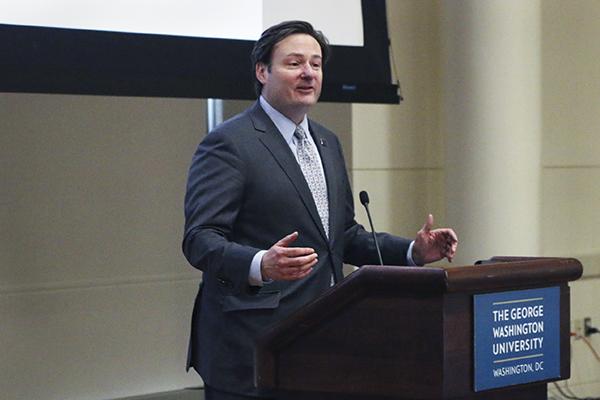When Provost Steven Lerman steps down from his position at the end of this year, the University will lose a key proponent for its international programs – a loss that faculty and experts believe the University’s global projects will be able to endure.
Lerman prioritized internationalization at GW through a decade-long strategic plan which aimed to double the international student population. And with a new senior associate provost for international strategy, faculty have fewer concerns on how their programs will continue without Lerman’s experience and leadership.
Lerman had previously helped lead an effort to start a satellite campus in China, a plan that was eventually abandoned. In its wake, a group of 12 professors has worked with him in a group called the China Initiatives Committee to create different programs and avenues for the University to partner with China.
But such a complex international project could still have its hiccups. David Shambaugh, the director of GW’s China Policy Program, said he’s unsure about the future of the plans with China once Lerman steps down.
Shambaugh added that the committee has struggled with planning for a partnership after administrative divisions dealt with University-wide budget cuts.
“The globalization of GW was a very key and central part of the strategic plan, but it is also a very expensive and bureaucratically complex thing to implement, no matter what country or region of the world,” Shambaugh said.
But the group of faculty will not be left without a leader — Doug Shaw was hired as the University’s first associate provost of international strategy last year.
Shaw said that Lerman has “shared his work with the China Initiatives Committee.” He said continuing Lerman’s work on initiatives in China is one of his priorities for the year.
“I am grateful for their work and look forward to convening with them soon to discuss their recommendations,” Shaw said in an email.
Shaw said he is “particularly thankful” to Lerman for laying the groundwork to create viable partnerships with Chinese institutions through a University-wide committee.
Focus on internationalization
GW has increasingly prioritized its international profile in areas like fundraising, research and recruiting students.
Shaw said he plans to continue Lerman’s pushes to expand GW’s global presence this academic year, including efforts to increase “geographic diversity” of enrolled international students, improving international student satisfaction and expanding global research.
Shaw added that he is working this year to bring the International Services Office, the Office of International Programs, the Office of Study Abroad and China Operations together into “one unified team.” He has already started working with administrators on those efforts since beginning his post in July.
“I am consulting with University leaders, faculty members, students and other stakeholders to coordinate and support their efforts,” Shaw said.
Shaw served as an assistant professor of international affairs and the associate dean for planning, research and external relations in the Elliott School of International Affairs. As senior associate provost of international strategy, he will coordinate international components of the University, including opportunities for research, philanthropy, recruiting and study abroad. Lerman cited the position as a logical component of the strategic plan in an interview last year.
About 3,600 international students are enrolled at GW, according to the Office of Institutional Research and Planning. About 44 percent of those international students are from China, and close to nine percent are from South Korea.
Overseas research has also been a priority for the University during Lerman’s tenure as provost. Between 2007 and 2012, GW secured about 2,300 international scholarship and research deals, and started an exchange program with a billionaire alumnus in Turkey.
Lerman’s global legacy
Lerman was known for his dedication to globalization in various aspects of the University.
When he first designed the strategic plan in 2012, Lerman planned to designate more housing and offer more English courses for international students.
Since then, Lerman has revitalized the University’s global degree program, which came to a halt in 2013 after University officials had not planned on how to share revenue with partner schools. The program — which officials will start recruiting for this fall — is intended to allow students to study on three continents while earning their bachelor’s degrees.
Lerman has pushed deans of individual schools to collaborate more with universities in countries where their schools had wanted to strengthen ties. The School of Business partnered with researchers in South Korea soon after.
Young-Key Kim-Renaud, the chair of the department of East Asian languages and literature, said she has appreciated Lerman’s efforts and hopes the interim provost can continue “in the same vein,” but said she doesn’t fear internationalization will be lost without his leadership.
“It cannot be concentrated in one person interested in internationalization,” Kim-Renaud said. She cited established global exchange programs in the Elliott School of International Affairs, the School of Business, and the School of Medicine and Health Sciences as ways that GW will be able to keep strong international ties.
“There are lots of good global exchanges going at many different levels, not only in the Elliott School, but in every school,” she said.
Ronald Spector, a professor of history and international affairs, added that GW has had a global focus since Lerman arrived in 2010, and expects that trend to continue.
“GW has always had an international focus. Most universities throughout the U.S. are very interested in more cooperative programs with other entities and setting up campuses. We may have already done that,” Spector said.
Jennifer Delaney, an assistant professor of higher education at the University of Illinois at Urbana-Champaign, said a “changing of the guard” when the University hires a new provost could cause a lull in globalization efforts, but that international efforts could be carried on by other leaders in the school.
“Provosts are really important positions and very much can shape what institutions do, be it international partnerships or having a more internationalized curriculum,” Delaney said. “Not all provosts speak internationalization.”
Emma Tyrell contributed reporting.







